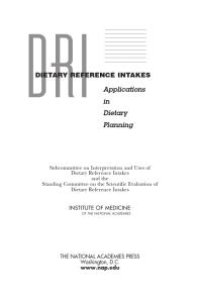
Ebook: Dietary Reference Intakes: Applications in Dietary Planning
Author: Institute of Medicine, Standing Committee on the Scientific Evaluation of Dietary Reference Intakes, Subcommittee on Interpretation and Uses of Dietary Reference Intakes
- Year: 2003
- Publisher: National Academies Press
- City: Washington, D.C., United States
- Edition: 1
- Language: English
- epub
Trigonometry has always been an underappreciated branch of mathematics. It has a reputation as a dry and difficult subject, a glorified form of geometry complicated by tedious computation. In this book, Eli Maor draws on his remarkable talents as a guide to the world of numbers to dispel that view. Rejecting the usual arid descriptions of sine, cosine, and their trigonometric relatives, he brings the subject to life in a compelling blend of history, biography, and mathematics. He presents both a survey of the main elements of trigonometry and a unique account of its vital contribution to science and social development. Woven together in a tapestry of entertaining stories, scientific curiosities, and educational insights, the book more than lives up to the title "Trigonometric Delights." Maor, whose previous books have demystified the concept of infinity and the unusual number "e," begins by examining the "proto-trigonometry" of the Egyptian pyramid builders. He shows how Greek astronomers developed the first true trigonometry. He traces the slow emergence of modern, analytical trigonometry, recounting its colorful origins in Renaissance Europe's quest for more accurate artillery, more precise clocks, and more pleasing musical instruments. Along the way, we see trigonometry at work in, for example, the struggle of the famous mapmaker Gerardus Mercator to represent the curved earth on a flat sheet of paper; we see how M. C. Escher used geometric progressions in his art; and we learn how the toy Spirograph uses epicycles and hypocycles. Maor also sketches the lives of some of the intriguing figures who have shaped four thousand years of trigonometric history. We meet, for instance, the Renaissance scholar Regiomontanus, who is rumored to have been poisoned for insulting a colleague, and Maria Agnesi, an eighteenth-century Italian genius who gave up mathematics to work with the poor--but not before she investigated a special curve that, due to mistranslation, bears the unfortunate name "the witch of Agnesi." The book is richly illustrated, including rare prints from the author's own collection. "Trigonometric Delights" will change forever our view of a once dreaded subject.
Download the book Dietary Reference Intakes: Applications in Dietary Planning for free or read online
Continue reading on any device:

Last viewed books
Related books
{related-news}
Comments (0)